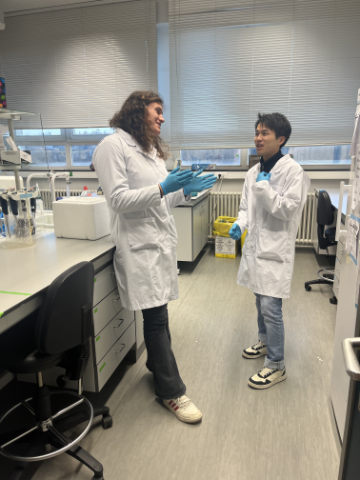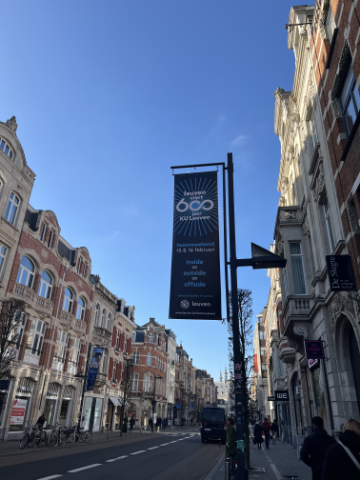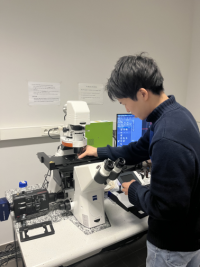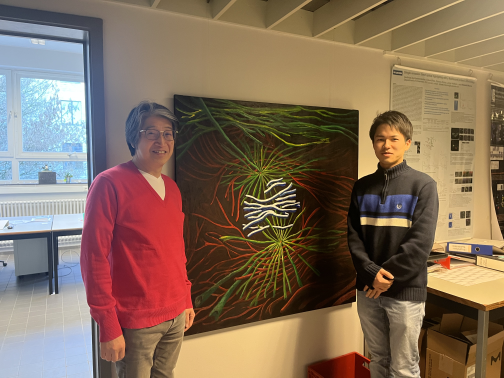|
Tomoaki NAKATSUKA |
Background of the visit
When Prof. Mizuno visited Kyoto University again in 2024, Nakatsuka was asked by Prof. Numata to give a presentation in front of Prof. Mizuno. TN’s research subject, natural rubber, has physical properties that cannot be reproduced with synthetic rubber, and he is conducting research to prove his hypothesis that this is due to the action of lipids and proteins contained in natural rubber. Prof. Mizuno is researching imaging using fluorescent proteins, so with this, they decided to collaborate by incorporating a new approach of fluorescent observation into TN’s research.
Prof. Numata is enthusiastic to encourage his students to gain experience overseas, and Prof. Mizuno was also very keen to accept him, so it was decided that Nakatsuka would go to Leuven using part of Prof. Numata’s research funds.
Preparation before departure
Before his departure, Nakatsuka had 3-4 online meetings with Prof. Mizuno to discuss what he would actually be doing at KU Leuven. Having the opportunity to speak directly with the professor in this way helped to allay some of his concerns. In terms of living arrangements, Nakatsuka had previously spent two weeks in the US as part of the curriculum of Super Science High School when he was in high school, so he already had an idea of what life would be like in English-speaking countries. Leuven is a university town located about 30km southeast from the Belgian capital Brussels. The city is in the Dutch-speaking part of the country, the impression I got from my visit was that you can survive in English for most things.
Current life
It was the beginning of February when we visited Nakatsuka , about two weeks after his arrival in Leuven. He seems to be gradually getting used to life there, each day very stimulating. He lives with the family of his landlord, communicating in English every day, while also his privacy being respected. Due to the high cost of living in Europe and the bad exchange rate, he is avoiding eating outside and is cooking for himself or using cafeteria for lunch. At the supermarket, he is trying out various ingredients with curiosity.
It was the timing when the reagents had just arrived, so Nakatsuka was happy to be able to start is experiments at last. Like the other lab members, he arrives at the lab around 10 am and leaves around 6pm every weekday. He also participates in the weekly lab meetings. He told us that there are no major differences between research life in Japan and Belgium, but that the Belgian lab members are very clear about when they switch off from work. They never stay in the lab late at night or on weekends. He also added that many of the lab members are very proactive and committed to their research, and that the atmosphere in the lab is positive. One of his current challenges is to improve his English, and actively communicating with other lab members to overcome it.
 |
 |
Future plans
Nakatsuka’s immediate goal is to acquire technical knowledge and skills through his stay in Leuven and to advance his own research. It is possible to conduct the same research at Kyoto University’s facilities, but being in this kind of environment is very stimulating in itself. So, he wants to make the most of this opportunity to receive direct supervision from Prof. Mizuno and use it to grow, including his English.
He hopes to use his weekends to experience other cultures, not just those of Leuven or Belgium. KU Leuven, founded in 1425, will celebrates its 600th anniversary in 2025, and various events are planned. Hopefully he will be able to feel the celebratory mood of Leuven. Such opportunity comes around only once every 100 years!
After completing his master’s degree. Nakatsuka will go on to doctoral course. The days in Leuven may be a time for his to reflect on his future career paths and learn about the various possibilities that lie ahead.
We would like to thank Prof. Hideaki Mizuno of KU Leuven and Prof. Keiji Numata of Kyoto University for kindly arranging our interview with Mr. Tomoaki Nakatsuka.




